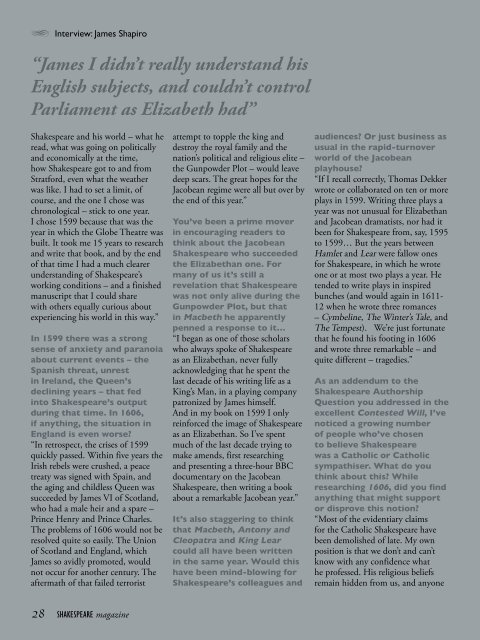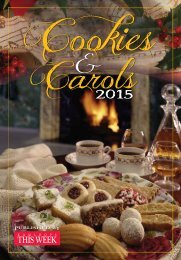Shakespeare Magazine 9
Create successful ePaper yourself
Turn your PDF publications into a flip-book with our unique Google optimized e-Paper software.
Interview: James Shapiro<br />
“James I didn’t really understand his<br />
English subjects, and couldn’t control<br />
Parliament as Elizabeth had”<br />
<strong>Shakespeare</strong> and his world – what he<br />
read, what was going on politically<br />
and economically at the time,<br />
how <strong>Shakespeare</strong> got to and from<br />
Stratford, even what the weather<br />
was like. I had to set a limit, of<br />
course, and the one I chose was<br />
chronological – stick to one year.<br />
I chose 1599 because that was the<br />
year in which the Globe Theatre was<br />
built. It took me 15 years to research<br />
and write that book, and by the end<br />
of that time I had a much clearer<br />
understanding of <strong>Shakespeare</strong>’s<br />
working conditions – and a finished<br />
manuscript that I could share<br />
with others equally curious about<br />
experiencing his world in this way.”<br />
In 1599 there was a strong<br />
sense of anxiety and paranoia<br />
about current events – the<br />
Spanish threat, unrest<br />
in Ireland, the Queen’s<br />
declining years – that fed<br />
into <strong>Shakespeare</strong>’s output<br />
during that time. In 1606,<br />
if anything, the situation in<br />
England is even worse?<br />
“In retrospect, the crises of 1599<br />
quickly passed. Within five years the<br />
Irish rebels were crushed, a peace<br />
treaty was signed with Spain, and<br />
the aging and childless Queen was<br />
succeeded by James VI of Scotland,<br />
who had a male heir and a spare –<br />
Prince Henry and Prince Charles.<br />
The problems of 1606 would not be<br />
resolved quite so easily. The Union<br />
of Scotland and England, which<br />
James so avidly promoted, would<br />
not occur for another century. The<br />
aftermath of that failed terrorist<br />
attempt to topple the king and<br />
destroy the royal family and the<br />
nation’s political and religious elite –<br />
the Gunpowder Plot – would leave<br />
deep scars. The great hopes for the<br />
Jacobean regime were all but over by<br />
the end of this year.”<br />
You’ve been a prime mover<br />
in encouraging readers to<br />
think about the Jacobean<br />
<strong>Shakespeare</strong> who succeeded<br />
the Elizabethan one. For<br />
many of us it’s still a<br />
revelation that <strong>Shakespeare</strong><br />
was not only alive during the<br />
Gunpowder Plot, but that<br />
in Macbeth he apparently<br />
penned a response to it…<br />
“I began as one of those scholars<br />
who always spoke of <strong>Shakespeare</strong><br />
as an Elizabethan, never fully<br />
acknowledging that he spent the<br />
last decade of his writing life as a<br />
King’s Man, in a playing company<br />
patronized by James himself.<br />
And in my book on 1599 I only<br />
reinforced the image of <strong>Shakespeare</strong><br />
as an Elizabethan. So I’ve spent<br />
much of the last decade trying to<br />
make amends, first researching<br />
and presenting a three-hour BBC<br />
documentary on the Jacobean<br />
<strong>Shakespeare</strong>, then writing a book<br />
about a remarkable Jacobean year.”<br />
It’s also staggering to think<br />
that Macbeth, Antony and<br />
Cleopatra and King Lear<br />
could all have been written<br />
in the same year. Would this<br />
have been mind-blowing for<br />
<strong>Shakespeare</strong>’s colleagues and<br />
audiences? Or just business as<br />
usual in the rapid-turnover<br />
world of the Jacobean<br />
playhouse?<br />
“If I recall correctly, Thomas Dekker<br />
wrote or collaborated on ten or more<br />
plays in 1599. Writing three plays a<br />
year was not unusual for Elizabethan<br />
and Jacobean dramatists, nor had it<br />
been for <strong>Shakespeare</strong> from, say, 1595<br />
to 1599… But the years between<br />
Hamlet and Lear were fallow ones<br />
for <strong>Shakespeare</strong>, in which he wrote<br />
one or at most two plays a year. He<br />
tended to write plays in inspired<br />
bunches (and would again in 1611-<br />
12 when he wrote three romances<br />
– Cymbeline, The Winter’s Tale, and<br />
The Tempest). We’re just fortunate<br />
that he found his footing in 1606<br />
and wrote three remarkable – and<br />
quite different – tragedies.”<br />
As an addendum to the<br />
<strong>Shakespeare</strong> Authorship<br />
Question you addressed in the<br />
excellent Contested Will, I’ve<br />
noticed a growing number<br />
of people who’ve chosen<br />
to believe <strong>Shakespeare</strong><br />
was a Catholic or Catholic<br />
sympathiser. What do you<br />
think about this? While<br />
researching 1606, did you find<br />
anything that might support<br />
or disprove this notion?<br />
“Most of the evidentiary claims<br />
for the Catholic <strong>Shakespeare</strong> have<br />
been demolished of late. My own<br />
position is that we don’t and can’t<br />
know with any confidence what<br />
he professed. His religious beliefs<br />
remain hidden from us, and anyone<br />
28 SHAKESPEARE magazine











